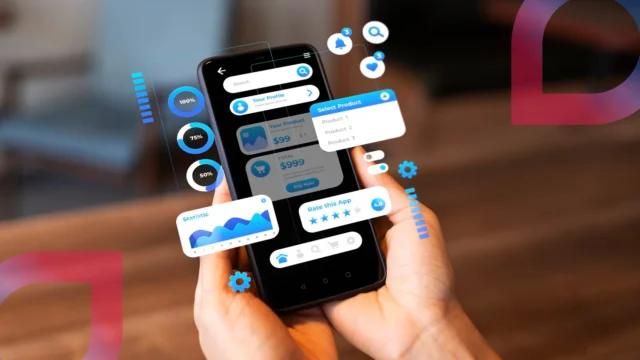In today’s competitive landscape, businesses must find innovative ways to connect with customers and differentiate themselves from the competition. App development has emerged as a powerful tool for building a strong brand presence. With the ability to engage users, enhance customer experiences, and reinforce brand identity, mobile applications play a vital role in modern marketing strategies. Here are some of the key benefits of app development for building a strong brand.

1. Enhanced Brand Visibility
A mobile app provides a dedicated platform for your brand, making it easily accessible to users. With millions of apps available, having your app on popular app stores like Google Play and Apple’s App Store increases your brand’s visibility. Users are more likely to engage with a brand that offers a convenient mobile solution.
Strategies for Visibility:
- App Store Optimization (ASO): Implementing ASO techniques helps your app rank higher in search results, driving organic downloads.
- Promotional Campaigns: Launching marketing campaigns to promote your app can further enhance visibility and attract new users.
2. Direct Customer Engagement
Mobile apps facilitate direct communication between brands and customers. Through in-app messaging, push notifications, and personalized content, brands can engage users in real-time, fostering stronger relationships and encouraging brand loyalty.
Engagement Techniques:
- Push Notifications: Sending timely updates, offers, or reminders keeps users engaged and informed about your brand.
- In-App Messaging: Allowing users to communicate with customer support or receive personalized recommendations enhances the customer experience.
3. Improved Customer Experience
A well-designed app can significantly enhance the overall customer experience. Features such as easy navigation, quick access to information, and seamless transactions contribute to user satisfaction. When customers have a positive experience with your app, they are more likely to associate that positive feeling with your brand.
Customer Experience Enhancements:
- User-Friendly Interface: Creating an intuitive and attractive interface makes it easier for users to interact with your brand.
- Personalization: Tailoring content and offers based on user behavior and preferences enhances engagement and satisfaction.
4. Increased Customer Loyalty
Mobile apps can foster customer loyalty through loyalty programs, rewards, and exclusive offers. By incentivizing users to engage with your brand regularly, you can build a loyal customer base that is less likely to switch to competitors.
Loyalty Building Strategies:
- Reward Programs: Offering points or discounts for in-app purchases encourages repeat business.
- Exclusive Access: Providing app users with early access to sales, promotions, or new products fosters a sense of belonging.
5. Brand Storytelling and Content Sharing
Apps provide a unique platform for storytelling and sharing content that resonates with your target audience. By creating engaging content—such as videos, articles, and interactive features—you can communicate your brand values and message effectively.
Content Strategies:
- Multimedia Content: Utilizing videos, infographics, and articles helps convey your brand story and engage users.
- User-Generated Content: Encouraging users to share their experiences with your brand fosters a sense of community and authenticity.
6. Data Collection and Insights
Mobile apps allow brands to collect valuable data on user behavior, preferences, and interactions. Analyzing this data helps businesses understand their audience better and make informed decisions about marketing strategies and product development.
Data Utilization:
- User Analytics: Tracking user behavior within the app helps identify trends and optimize user experience.
- Feedback Mechanisms: Implementing surveys or feedback forms within the app allows brands to gather insights directly from users.
7. Competitive Advantage
In a saturated market, having a mobile app can set your brand apart from competitors. Many businesses have yet to adopt mobile solutions, making app development an opportunity for differentiation. A well-executed app can position your brand as innovative and customer-centric.
Differentiation Strategies:
- Unique Features: Developing features that address specific customer pain points can give your app a competitive edge.
- Brand Identity: Ensuring that your app reflects your brand identity—through design, tone, and functionality—enhances brand recognition.
8. Facilitating Sales and Conversions
Apps can streamline the sales process, making it easier for customers to make purchases. Features like in-app shopping, secure payment options, and personalized recommendations can increase conversion rates and drive revenue.
Sales Optimization Techniques:
- Seamless Checkout: Simplifying the purchasing process minimizes friction and encourages transactions.
- Cross-Selling and Upselling: Utilizing user data to recommend additional products or services enhances the likelihood of increased sales.
9. Brand Advocacy and Word-of-Mouth Marketing
When customers have a positive experience with your app, they are more likely to share it with friends and family. Encouraging users to leave reviews and ratings can also enhance your brand’s reputation, leading to organic growth through word-of-mouth marketing.
Advocacy Strategies:
- Referral Programs: Implementing referral incentives encourages users to recommend your app to others.
- Social Sharing Features: Allowing users to share their experiences on social media enhances visibility and brand awareness.
Conclusion
App development is a powerful tool for building a strong brand in today’s digital landscape. By enhancing brand visibility, facilitating direct customer engagement, and improving customer experience, mobile apps can significantly contribute to brand loyalty and growth. Investing in app development not only positions your business as innovative but also creates opportunities for deeper connections with your customers.


No responses yet